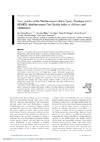Please use this identifier to cite or link to this item:
https://accedacris.ulpgc.es/jspui/handle/10553/44826
| Title: | Food, youth and the Mediterranean diet in Spain. Development of KIDMED, Mediterranean Diet Quality Index in children and adolescents | Authors: | Serra-Majem, Lluís Ribas, Lourdes Ngo, Joy Ortega, Rosa M. García, Alicia Pérez-Rodrigo, Carmen Aranceta, Javier |
UNESCO Clasification: | 32 Ciencias médicas 3206 Ciencias de la nutrición 3212 Salud pública |
Keywords: | Dietary habits Mediterrnean diet Children Spain |
Issue Date: | 2004 | Journal: | Public Health Nutrition | Abstract: | Objective: To evaluate dietary habits in Spanish children and adolescents based on a Mediterranean Diet Quality Index tool, which considers certain principles sustaining and challenging traditional healthy Mediterranean dietary patterns.Design: Observational population-based cross-sectional study. A 16-item Mediterranean Diet Quality Index was included in data gathered for the EnKid study (in which two 24-hour recalls, a quantitative 169-item food-frequency questionnaire and a general questionnaire about socio-economic, demographic and lifestyle items were administered).Setting: Spain.Subjects: In total, 3850 children and youths aged 2-24 years residing in Spain.Results: Of the sample, 4.2% showed very low KIDMED index results, 49.4% had intermediate values and 46.4% had high index results. Important geographical differences were seen, with subjects from the Northeast showing the most favourable outcomes (52% with elevated scores vs. 37.5% of those from the North). Lower percentages of high diet quality were observed in low socio-economic groups, compared with middle and upper income cohorts (42.8%, 47.6% and 54.9%, respectively). Large cities had more positive results and only slight variations were seen for gender and age.Conclusions: The KIDMED index, the first to evaluate the adequacy of Mediterranean dietary patterns in children and youth, confirms that this collective is undergoing important changes, which makes them a priority target for nutrition interventions. Results challenge certain commonly perceived notions tied to income level, population size and diet quality. | URI: | https://accedacris.ulpgc.es/handle/10553/44826 | ISSN: | 1368-9800 | DOI: | 10.1079/PHN2004556 | Source: | Public Health Nutrition [ISSN 1368-9800], v. 7, p. 931-935 |
| Appears in Collections: | Actas de congresos |
SCOPUSTM
Citations
1,074
checked on Jun 8, 2025
WEB OF SCIENCETM
Citations
1,013
checked on Jun 8, 2025
Page view(s)
68
checked on Aug 31, 2024
Download(s)
657
checked on Aug 31, 2024
Google ScholarTM
Check
Altmetric
Share
Export metadata
Items in accedaCRIS are protected by copyright, with all rights reserved, unless otherwise indicated.
